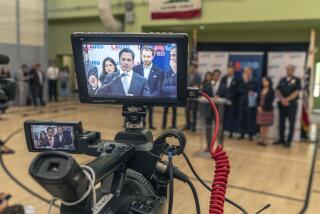At Some Back-to-School Nights, Apple Gets the Teachers : Marketing: The computer maker is enlisting instructors to plug its products. Critics say it compromises schools.
- Share via
In the technology lab of Los Angeles’ T.S. King Middle School, dozens of children were eagerly demonstrating computer skills to parents. Nearby, a videotape was showing a succession of kids cheerily doing research on home computers. Amid the hubbub, teacher Warren Dale was offering advice on buying computers.
It was back-to-school night, with a commercial twist. Though the parents and children did not know it, the computer software, the videotape and Dale’s tips were provided by Apple Computer Inc. as part of a sophisticated program to sell computers.
Apple has enlisted teachers at 1,000 schools nationwide to plug its products in an attempt to use its dominance in the education market to boost home computer sales. By persuading teachers to conduct what amounts to a sales pitch, Apple is cleverly using to its advantage the influence educators have with parents and students.
The program appeals to teachers because Apple gives them $100 worth of software to use for their classrooms at a time when many school districts cannot afford the equipment. But some educators and consumer advocates warn that teachers who help promote Apple computers risk undermining public confidence in schools.
“Schools have a reputation to uphold as authoritative, reliable and objective,” said Charlotte Baecher of Consumers Union. “Just because schools are over a barrel does not give them [Apple] free rein. They should not be using schools to sell.”
Apple’s initiative capitalizes on the ascent of computer literacy to the ranks of the three Rs. In September, President Clinton announced a goal of putting computers in every school by 2000, signaling the importance of technology skills.
The message wasn’t lost on parents--or on companies such as Apple that want to sell them computers.
Lou Retha Harrison picked up an old IBM model this fall so her 12-year-old daughter could practice keyboarding and do reports. But after attending an Apple demonstration in Compton similar to the one at T.S. King, Harrison fretted because her antiquated machine can’t play educational CD-ROMs.
“What I want for her is a computer that has encyclopedia” software, Harrison said.
Apple came up with the “Family Computing Workshops” a year ago, as the home computer market started heating up. About 45 schools in Los Angeles County participate.
The program is available only to schools with Macintosh computers. Teachers follow a script prepared by Apple and distribute a toll-free number so parents can call Apple for more information. In school computer labs surrounded by Macs, teachers provide parents with questions to ask before buying a PC: What computer is the school using? What experience do family members have with computers?
Parents evidently figure out the answers. Teachers don’t take orders for equipment, but Apple dealers attending some workshops report land-office sales. Metro Business Systems, a Connecticut dealer, took orders for $80,000 worth of Apple computers at a workshop in Norwalk last month. “I tell you, the program works,” dealer Chris Urasaki said.
If attendance is any indication, the workshop at T.S. King was a success. More than 100 parents trooped through the lab with their children and left with a bagful of literature from Apple. On their way out, they wrote their names and addresses on a sign-in sheet to be mailed to Apple’s headquarters, so the company can send them surveys to determine if they bought an Apple.
Dale, a zealot about technology and a fan of Apple products, was enthusiastic about the program. He downplayed his role in the pitch, saying the students who were happily manipulating the Mac software for their parents were the best salespeople.
“If this makes parents go out and buy a Mac, I think that’s great,” Dale said. “Every kid can benefit from having a computer at home.”
Apple worldwide marketing manager Paul Papageorge said teachers are critical to the program’s success because parents regard them as educational experts and tend to heed their advice. Asked if teachers function as an unpaid extension of Apple’s sales force, Papageorge said, “Exactly.”
Apple encourages teachers to hold workshops on back-to-school nights, when a large turnout is usually assured. The company also encourages sales reps to attend.
*
Nonetheless, Apple insists that selling computers is only one objective of the program. Its marketing managers say that besides moving computers, the after-school workshops help involve parents in the schools and educate parents about technology, two noncommercial aims.
The company says its materials were screened by outside experts to make sure they were not overly promotional. Parents completing evaluation forms agreed, rating the workshops highly for providing relevant information and for drawing parents into schools, Apple said.
“Yes, there is an Apple logo [in the video presentation] and yes, we do talk about Apple,” says Grace Hong, a marketing manager at the computer company. “We’ve invested money in this. From a corporate point of view, we have to get some benefit.”
But some consumer advocates and educators worry that the Apple program has the potential to erode the principles of objectivity and fairness that are the basis of public education. If teachers stick to the Apple script, parents won’t learn that other computers may be cheaper or more useful for their children, they say.
Apple’s computers receive “the endorsement of the teacher, the imprimatur of the school,” said Alex Molnar, an education professor at the University of Wisconsin-Milwaukee, in assessing the program. “It makes kids want an Apple computer.”
Indeed, schools that participate “risk exposure to claims they are sponsoring a product line,” said John Valle, executive director of Computer Using Professionals, an Alameda-based organization that acts as a clearinghouse for corporate-sponsored technology programs available to schools.
“A salesman for another computer company is going to attend one of these things, and the district will catch it from behind,” Valle said after hearing a description of the program. “It is a problem.”
On the educational marketing front, Apple appears well ahead of other technology companies. A program several years ago in which it gave a free computer to any school requesting one gave it a leg up in public school classrooms. The company now has 63% share of the market in public schools, a base it is attempting to use to propel its computers into the home market, where it faces intense competition from IBM, Compaq, Packard Bell and others.
In the marketing race, other technology companies are showering freebies on schools that in many cases couldn’t otherwise afford the services. AT&T; this month announced plans to give free Internet access and voice-messaging services to 110,000 schools. More than a charitable gesture, the move introduces students, tomorrow’s consumers, to the company’s services.
Similarly, Pacific Bell is refurbishing 1 million used computers and donating them to public schools, providing students with a potential link to the technology highway the company is building, besides helping to create future PacBell customers.
But educators and consumer advocates said in interviews that they knew of no other program that, like the Apple workshops, requires teachers to help promote a product in exchange for free equipment. They said the Apple program is a manifestation of the financial pressures on schools. In California, 45% of computers are antiquated, according to the Palo Alto-based Computer Learning Foundation, and few schools can afford the latest equipment.
“What schools are trying to balance is how to provide technology to our students in a [poor] fiscal environment,” said Brian Lewis, assistant executive director of the California School Boards Assn. “Ideally, the state and the local district would provide [software] for schools and teachers would not have to do this.”
Besides giving teachers badly needed software for their classrooms, Apple offers teachers a chance to win more equipment for their schools. Teachers who held a workshop by early December were eligible for a drawing in which they could win a grand prize of five laptop computers, worth $21,000, or five other technology prizes worth around $300 each.
“We have very little money, practically none,” said David Satterberg, a teacher in Duarte, explaining why he participates in the Apple workshop program. “You keep your ears open for information about donations or inexpensive equipment.”
The technology giveaways are also the latest example of how schools are increasingly open to corporate help. Rare is the school that doesn’t swap supermarket register tapes for equipment, or reward students who are good readers with a coupon for a free Pizza Hut pizza.
*
In a report issued earlier this year, Consumers Union counted 111 corporate-sponsored learning aids and contests, ranging from the National Potato Board’s Count Your [Potato] Chips mathematics aid to the Kellogg’s Get Going With Breakfast program. The consumer organization, which publishes Consumer Reports, found that most of the materials plug products.
Educators and consumer advocates said that technology is a pressure point for schools because the equipment is considered vital to prepare students for work in the Information Age.
“Technology has an aura of unqualified good about it,” said Molnar, the education professor at the University of Wisconsin-Milwaukee, who is writing a book about commercialism in schools. “These are the high-tech, high-skill jobs of the future, and schools are terrified of not finding a place in it. This kind of program is getting a free ride in terms of the scrutiny it should be getting,” he said of the Apple workshops.
Of two dozen teachers interviewed, many said they had mixed feelings about conducting Apple workshops. They said they liked the video because it showed parents how children use computers. But teachers said they were uncomfortable about giving a sales pitch.
“The message is real clear: Go out and buy a computer,” said Susanna Verdugo, a Bell Gardens teacher who held a workshop mostly to obtain the software. The package from Apple contained the useful Grolier Multimedia Encyclopedia.
Verdugo said she made a point of telling parents they did not need to buy a computer. Although the school is in a poor neighborhood, parents would make the sacrifice to buy a computer if their children needed one, she said.
Robert Lee, a teacher at Cahuenga Elementary in Los Angeles, also deviated from the Apple script, telling parents attending his workshop about other personal computer brands. Even so, when his presentation ended, a parent asked a dismayed Lee whether he was an Apple rep.
“Even though it was a sales job, I tried to get across I wasn’t a salesman,” Lee said. “I guess I wasn’t clear enough.”






